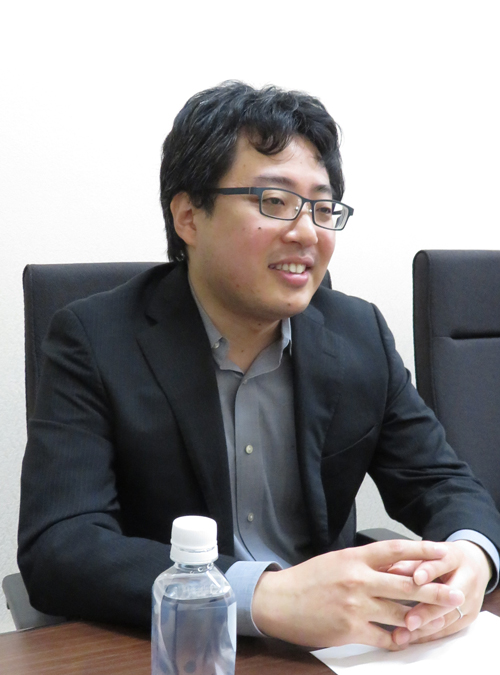- HOME
- About AIS
- Student Testimonials
- Alumni Voices
- Daisuke Miyamoto (Kanzaki - Takahashi Lab.)
Daisuke Miyamoto (Kanzaki - Takahashi Lab.)

-
I completed my studies in the Department of Advanced Interdisciplinary Studies in March 2018, and in April 2018 I joined a foreign-owned cloud computing company. While I was in graduate school, I used the K supercomputer in research which efficiently simulated neural circuits patterned after the brains of insects, operating roughly 700,000 CPU cores in parallel. The theme of my doctoral paper was "Research regarding methodologies for efficiently simulating large, detailed neural circuits using next-generation supercomputing environments." My doctoral advisor, Professor KANZAKI, mentored me for roughly seven years, including my time in the master's program. His sincere research approach, which always encouraged those around him, often helped me out, and I feel truly grateful to him.
Colleagues with diverse backgrounds
One of the features of the Department of Advanced Interdisciplinary Studies is the diversity of backgrounds of its students. There were students who went on to higher learning after first working in a company, and discovering they had a passion for academia, and students who entered the department after studying abroad. Of course, some of the students in the department came from the University of Tokyo itself, but since there is no master's program, it seems that students naturally come from a wide range of departments and faculties.
The diversity of the department's student body contributes to the diversity of its research ideas. For example, one colleague in my research lab who had formerly worked in a manufacturing company was very organized in his experimental methods and behavior. His background, having learned through his work in a company, was novel for me, who at the time had no experience outside the research field. It had a very positive impact on me.
The Department of Advanced Interdisciplinary Studies brings together people with unique backgrounds, and they stimulate each other. For people who are seeking to do something different, studying here provides a very valuable experience.
Taking on challenges as a team, using specialization as a strong suit
Lectures also provided opportunities for interchange with students from other research labs. Of particular interest to me was the course on advanced social issues. It was a small class, and we engaged in deep discussions.
There were no clear answers to the topics we were discussing. For example, one topic was this: "The Earth is about to be destroyed. There are two escape rockets, and the people that will be boarding them are gathered together. Just before launch, one of the rockets fails. Use the profiles of the crews to decide who should be allowed to board the other rocket and survive."
The course tested our ability to think of ways to discuss the issue in a manner that would elicit good ideas. I remember primarily using my search algorithm knowledge to consider how to produce discussion which would be good in an engineering sense.
A classmate that was concurrently working in a government agency was overwhelmingly knowledgeable about the social sciences. People with different specializations have different ways of thinking and coming up with ideas. Everyone used their specialization as a strong suit, tackling challenges while maintaining team balance, which was a stimulating process distinctive of the Department of Advanced Interdisciplinary Studies.
Providing academic experience to companies and company experience to academia
One of my great concerns as a student was my career path after receiving my doctorate. I was anxious about whether or not the research I was engaged in would tie in to a future career. However, when I actually began looking for work, I found that in addition to my research results, my research lab network management, research-related web service creation, and other activities were all held in high regard. There are, of course, always unknowable factors, such as luck and timing, but I strongly feel that I will be able to use the knowledge and experience I accrued through the process of earning my doctorate in a wide range of corporate and other environments.
I want to use the supercomputer knowledge and research methods I learned in the Department of Advanced Interdisciplinary Studies in my future work. At the same time, I will also keep in mind the potential for operational improvements achieved through cloud technology and the like to contribute to academia in turn.


